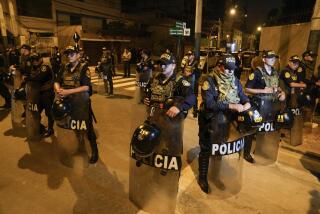Marcos Kin, Friends Avoided $15 Million in Taxes on Luxury Cars, Records Show
- Share via
MANILA — The family and friends of former President Ferdinand E. Marcos cheated the Philippine government out of more than $15 million in import taxes over the last two years on a fleet of luxury foreign cars bought largely for their personal use, according to documents turned over to government investigators by a former member of Marcos’ Presidential Security Command.
The fleet included 299 Mercedes-Benzes, BMWs, Porsches, Jaguars, Ferraris, Audis and Rolls-Royces imported by Marcos’ wife, Imelda, by his children, and by many close Marcos friends and Cabinet ministers.
According to the documents, all of Marcos’ children--and even a 3-year-old grandchild--were allowed to import the luxury cars without paying the required 310% duty, a fee designed to protect the domestic auto industry--Philippine assembly plants of Japanese and other foreign auto makers--against competition. These Philippine assembly plants have since ceased operations, leaving the government with millions of dollars in unpaid loans.
Impounding Order
On Monday, the government of President Corazon Aquino ordered that all of the cars be turned over to the government customs office and impounded within the next three days.
“These people really like to live like kings, queens, princes and princesses,” said Aquino’s newly appointed customs commissioner, Wigberto Tanada, in an interview Monday.
Tanada said Marcos’ presidential office alone had imported 182 Mercedes and BMWs tax-free between 1984 and 1986--a period when the Philippine economy was crumbling and the average annual income of many Filipinos fell below the poverty line for the first time in more than a decade.
Yet, only a few of the cars were found at Malacanang presidential palace or at the private residences of Marcos’ family after they fled to Hawaii last month.
“We still don’t know where all these cars are,” Tanada said, adding that he was declaring a 72-hour grace period, during which time the cars’ owners are permitted to hand over their vehicles without penalty.
Search for Assets
The customs official’s investigation is among dozens of internal audits by the Aquino government aimed at tracking down the assets left behind by the former president, who is said to have amassed a hidden fortune variously estimated at $3 billion to $10 billion during his 20 years in office.
The audits, which began soon after Marcos fled the country Feb. 25 amid a civilian and military rebellion against his regime, have already shown that Marcos’ relatives gained tens of millions of dollars from illegal timber sales and that tens of millions of additional dollars in gold and cash were diverted from the national treasury.
The customs investigation into the luxury automobile fleet began Saturday, when a colonel who had been assigned to the president’s security staff to smuggle the cars into the country turned over hundreds of pages of records to Tanada’s commission.
Documents given to the panel show that the Marcos family and aides evaded the import duties by ordering customs officials to sign waiver forms called “memorandum receipts,” Tanada said. The forms said that each car had been seized by government excise officials and were needed for the official business of the First Family and that of various ministries.
Disguised Use
But Tanada said all of the cars appear to have been bought new by the president’s office and other officials and primarily used for personal business.
“Even still,” he added, “they certainly did not need luxury cars.”
Among the documents were import tax waivers for the personal Mercedes-Benz coupe of Marcos’ daughter, Imee Marcos Manotoc, and one “for the official use” of President Marcos’ grandson, Alfonso Araneta, who is 3 years old.
In all, Tanada said, more than 300 million pesos--about $15 million--in taxes went unpaid on the 299 cars. The commissioner added that the legal clause permitting such tax-free imports is being repealed.
“If we have to,” he added, “we can drive used Toyotas.”
More to Read
Sign up for Essential California
The most important California stories and recommendations in your inbox every morning.
You may occasionally receive promotional content from the Los Angeles Times.









